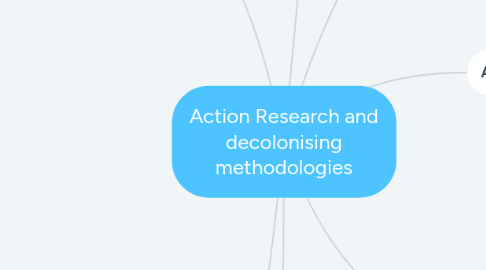
1. Participatory Action Research (PAR)
1.1. It involves researchers and participants working together to understand a problematic situation and change it for the better. Goal of achieving social change
1.1.1. USE
1.1.1.1. It is based on reflection, data collection, and action that aims to improve health and reduce health inequities through involving the people who, in turn, take actions to improve their own health.
1.1.2. a macro method that provides the context in which research and action can occur
1.2. Setting up PAR
1.2.1. 1. Planning (Develop a description of the situation – What is happening? Who is affected? What are the possibilities? With whom will I have to negotiate?)
1.2.2. 2. Data-Collection (Photos, tapes, interviews...)
1.2.3. 3. Other forms (Photo-voice, participant observation)
1.3. Three principles of PAR
1.3.1. 1. Research with exploited/oppressed communities
1.3.2. 2. Research addresses specific concerns of community and fundamental causes of the oppression, with goal of achieving positive social change
1.3.3. 3. Process of research, education, and action with all participants contributing, learning, and transforming
1.4. Research Process of PAR
1.4.1. 1. Establishing relationships with community members
1.4.2. 2. Request from community to support research project
1.4.3. 3. Agreement on shared responsibility for research design, data collection, data analysis, development and implementation of change
1.5. How does PAR differ from other methodologies?
1.5.1. - Explicit role of researcher in seeking social justice and human liberation - Focus on research to enable action - Aim for equal power relationships
2. Criteria for judging PAR
2.1. 1. Articulation of objectives 2. Partnership and participation 3. Contribution to action research theory/practice 4. Methods and process 5. Actionability 6. Reflexivity 7. Significance
3. Disadvantages
3.1. 1. Maintaining symmetrical dialectic tension 2. Maintaining critical awareness despite ambiguity 3. Disagreements between PAR members 4. Maintaining commitment
4. Decolonising methodologies
4.1. approach that is used to challenge the Eurocentric research methods that undermine the local knowledge and experiences of the marginalised population groups
5. Action research
5.1. Way of trying out changes and seeing what happens
5.2. Different terms
5.2.1. Participatory action research Community action research Community-based participatory action research
5.3. Research motivated by social change
5.4. Process of Action Research
5.4.1. 1. An existing state of affairs is considered problematic 2. It is identified, named, and described 3. Attempts are made to change it 4. These attempts are monitored 5. Repeat as necessary
6. History
6.1. Kurt Lewis
6.1.1. Studying things through changing them and noting the effects
